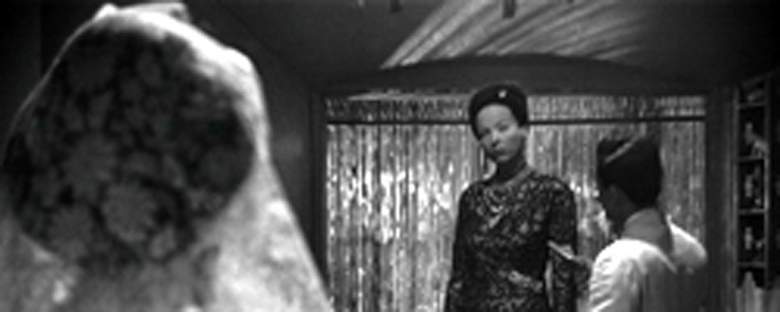Reviews
William Wyler
USA, 1940
Credits
Review by Matt Bailey
Posted on 14 January 2005
Source Warner Bros. DVD
If you have not seen The Letter, I advise you to click away from this review. There is no way to discuss this movie without revealing essential plot points. Come back after you watch it.
Those of you still with me won’t need catching up on the plot. You already know that Bette Davis’ face shows no fear as she empties a revolver into the body of her lover who, remarkably, is never otherwise shown in the film—even in flashback. He is like the title character in Rebecca: a figure never seen but around which the entire story centers. You already know that her lace making is the frighteningly precise work of a woman without a trace of guilt on her conscience; she occupies herself with it during her trial for murder as calmly as she would on a cozy evening by the fire. You already know that the film is worth multiple viewings. I daresay you have seen it more than once already.
If there is any doubt that Bette Davis is the star of this film, high above all others, it is vanquished by William Wyler’s careful framing of her in every shot. When Davis is alone in a shot, the settings seem almost draped around her as if it were velvet arranged to set off a jewel. When she is in shots with other actors, they are often turned with their backs to the camera and pushed to the side of the frame so to better enclose the star at the center. Yet, Davis underperforms her role. As a woman accused (in fact, guilty) of murder, one would likely expect her to be leaving no piece of scenery unchewed, to be stalking from one end of the set to the other, clenching her fists and gasping and fuming as if she were about to breathe fire. This is, after all, the Bette Davis we have come to expect from films like Of Human Bondage and Dangerous. In collaboration with William Wyler, however, Davis always seems to be tempered, to be at her most subtle and affecting. It was under his direction, after all, that she won her second Oscar for Jezebel and that she was nominated as Best Actress every time they worked together. Perhaps, as a rumored lover, Wyler knew how to tame Davis’ more vain impulses, or perhaps, as is evident from his other work, he simply knew how to get subtle work from even the hammiest of performers. When Davis’ character is murdered in the street at the end of the film, it comes not as a melodramatic shock but as an almost preordained resolution. What gives us the unexpected chill, though, is that Davis walks quietly into it and does not perform a tour-de-force death scene. She surrenders her ego to the good of the film and allows her character to slump, anonymously, in the gutter as the camera pulls back and away, providing the perfect tragic ending and concluding an intelligent and subdued performance by an often brash, brassy—but never less than outstanding—actress.
We don’t do comments anymore, but you may contact us here or find us on Twitter or Facebook.



